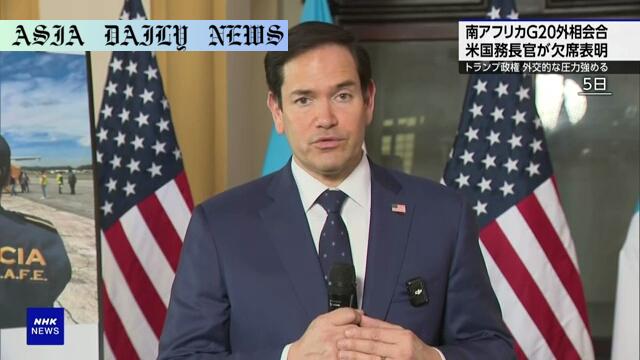Rubio: US Secretary of State Marco Rubio opts out of G20 Meeting, citing land expropriation and anti-American sentiment in South Africa.
Rubio announced he will not attend the G20 Foreign Ministers’ Meeting in South Africa.
He cited South Africa’s policies on land expropriation and its use of G20 themes like ‘solidarity and equality’ as reasons for his decision.
South Africa’s government responded, defending its democratic values and intentions to foster equity for the Global South.
US President Trump has taken a strong stance against South Africa, halting funding and accusing the country of discriminatory policies.
The controversy highlights deeper divisions in global diplomatic relations and differing opinions on themes like equity and sustainability.

Rubio Declines Participation in G20 Meeting
US Secretary of State Marco Rubio has made headlines with his announcement that he will not attend the upcoming G20 Foreign Ministers’ Meeting scheduled for February 20 and 21 in Johannesburg, South Africa. His decision, made public through social media, has created ripples on both domestic and international fronts. Rubio’s comments singled out South Africa’s policies, particularly on land expropriation and its thematic focus within the G20 context on ‘solidarity, equality, and sustainability.’ He expressed concerns that such themes, in his words, revolve around diversity, equity, and inclusion (DEI) and climate change, which, according to him, fail to align with advancing America’s national interests.
The Basis of Rubio’s Stance
Rubio’s absence from the meeting appears to stem not only from disagreements on policy but also ideological differences. His critique includes accusations that South Africa’s leadership promotes anti-American sentiments. This clash of visions is particularly pronounced with Rubio opining that taxpayer investments should prioritize domestic goals rather than ‘coddling anti-Americanism.’ Such rhetoric reflects a growing wave of US skepticism toward multilateral frameworks addressing global challenges.
Trump and Musk Weigh In On South Africa
Further fueling the situation has been input from other prominent American figures. US President Donald Trump has raised accusations of discriminatory policies in South Africa, claiming that ‘certain classes of people,’ particularly whites, are the victims of discriminatory land expropriation. His response has gone beyond rhetoric, halting funding to South Africa until what he calls a full investigation into these policies and allegations is conducted. Adding to this discourse is Elon Musk, a South African-born US billionaire, who has expressed similar critiques, arguing that South Africa’s domestic policies unduly disadvantage white communities. These voices amplify the tensions between the two nations ahead of a potentially polarizing G20 meeting.
South Africa’s Defense
In response to Rubio’s decision and the broader backlash from the US, South Africa’s Minister of International Relations and Cooperation issued a formal statement repudiating these allegations. The statement asserts that South Africa is a sovereign, democratic nation committed to upholding principles of human dignity and equality. While the concept of land redistribution is openly acknowledged within South African political frameworks, its government has denied any arbitrary or discriminatory dispossession of private property. Addressing Rubio’s objections, the minister clarified that South Africa’s G20 Presidency would focus not solely on climate change but also on fostering equity and fairness on a global scale, particularly for nations in the Global South.
The Broader Importance of the G20
The G20, a platform bringing together the world’s largest economies, serves as a critical forum for addressing global economic and social challenges. South Africa’s proposed agenda—touching on equity, sustainability, and solidarity—is rooted in advocating for underrepresented nations. Despite the confrontational rhetoric from Rubio and other figures, these ideals resonate with the broader Global South, promising to elevate discussions around structural inequities within the global system.
The Global Implications of Rubio’s Decision
Rubio’s announcement, alongside Trump’s similar criticisms, underscores a recurring theme of US retrenchment from multilateralism. Decisions to withdraw from events like the G20 often send signals beyond political disagreements, suggesting broader philosophical divides in how nations perceive cooperative frameworks. Rubio’s stance prioritizes immediate American interests but risks isolating the country diplomatically. On the flip side, this incident also highlights how contested themes like land redistribution, equity, and climate change remain central to international relations.
Looking Ahead
The fallout from Rubio’s decision will likely reverberate across diplomatic discussions leading up to the G20 meeting. While the US spearheads criticism, it gives other nations room to weigh in on critical humanitarian and social issues. As this exchange evolves, it raises questions about the success of multilateral forums like the G20 in bridging ideological divides among the world’s most powerful nations.



Commentary
Understanding Rubio’s Position
US Secretary of State Marco Rubio’s decision to withdraw from the G20 Foreign Ministers’ Meeting in South Africa is both bold and controversial. On one hand, his rationale underscores a sincere commitment to advancing America’s interests and avoiding what he perceives as unnecessary entanglements in ideologically driven international agendas. However, his withdrawal and public critique of South Africa’s policies signal a stark departure from traditional diplomatic engagement. Rubio’s actions reflect his prioritization of pragmatic, results-oriented governance, but they also open the door to broader geopolitical concerns and criticisms of isolationist tendencies.
South Africa’s Perspective
The South African government’s response is measured and defensible. Its claims of seeking equity for marginalized nations accentuate the importance of inclusivity in global policymaking. While Rubio may challenge its agenda as distracting or anti-American, South Africa’s leadership is right to articulate the concerns of the Global South. Multilateral platforms like the G20 are designed, in part, to bring such perspectives to the world stage. From a diplomatic perspective, Rubio’s stance may inadvertently alienate potential allies in these conversations.
The Bigger Picture
This incident reveals deeper fault lines in global diplomacy, where ideological differences increasingly shape decisions on participation and cooperation. Rubio’s withdrawal, coupled with President Trump’s remarks on South Africa, exemplifies how domestic political narratives bleed into foreign policy. It also highlights the growing need for constructive dialogue rather than exclusionary tactics. Nations like South Africa deserve recognition for their efforts to bridge global inequalities, even if specific policies remain contentious. Ultimately, refraining from dialogue risks prolonging these divides rather than addressing them effectively.